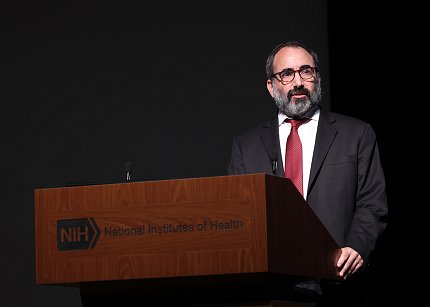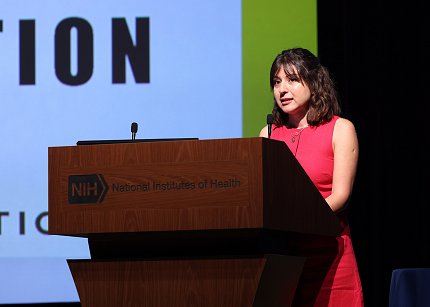Clinical Center Honors Graduating Fellows

Photo: Chia-Chi Charlie Chang
NIH’s Clinical Center (CC) held its second graduation ceremony in Masur Auditorium to mark the completion of training for clinical residents and fellows in accredited and nonaccredited graduate medical education (GME) programs.
The ceremony featured remarks from NIH Director Dr. Jay Bhattacharya, Acting CC CEO Pius Aiyelawo, senior investigator Dr. Theo Heller and graduating fellow Dr. Dilara Akbulut. This year, more than 80 graduates received fellowship certificates from their individual program directors.
“Research-trained physicians are critical members of the workforce who will develop the next generation of cures,” said Bhattacharya via video message. “We hope those graduating today will continue to be ambassadors for the value of training at the NIH Clinical Center and the importance of the NIH mission.”
The CC sponsors a variety of training programs, each of which is filled with rich learning experiences. The programs help fellows realize their potential as a physician, physician-scientist, clinical investigator, or institutionally based academician.
During training, fellows work collaboratively with distinguished researchers, are mentored by world-renowned physicians, participate directly in cutting-edge investigational protocols, and rotate to some of the nation’s finest academic medical centers within the metropolitan Washington, D.C., region for additional clinical experiences.
Keynote speaker Dr. Theo Heller called the ceremony a “punctuation point,” where graduates have an opportunity to stop and think about what has been and what will be.

Photo: Chia-Chi Charlie Chang
“It’s especially important to pause and reflect on perspectives if we want to be successful and get where we want to be,” said Heller, an NIH senior investigator who researches liver disease.
Many of the patients Heller sees are at their most vulnerable. Often, they tell him the importance of contributing to something beyond themselves. Physicians and doctors have an advantage over everyone else. Caring is built into the profession.
“The opportunity to help others in the most profound way is inherent in what we do,” he said.

Photo: Chia-Chi Charlie Chang
Heller challenged graduates to make a difference every day: “Do something that matters. Don’t get distracted by negativity. Don’t let anything stop you.”
One of the CC’s unique strengths is how doctors from different fields intersect with each other. “We collaborate across disciplines, combining knowledge and skills to unravel mysteries and bring hope to patients in ways no single specialty could achieve alone,” said Akbulut, a resident in the NIH’s National Cancer Institute’s Anatomic Pathology Program.
Early in her time at NIH, she saw her colleagues’ dedication firsthand. Late one afternoon, she noticed something on a slide and asked a colleague for their opinion. “It was almost 5 p.m. and I wasn’t expecting much,” she said. Everyone in the department, including the head, gathered. They discussed the question, consulted medical textbooks and found an answer.
Akbulut acknowledged the support she and her graduating class received from friends and family, mentors, colleagues and patients during their time at the CC.
“As we graduate today, we carry with us a shared purpose to advance science, to heal and to serve wherever we go,” she said. “Our commitment to these ideals will shape the future of medicine.”

Photo: Chia-Chi Charlie Chang
Emcee and chair of the GME committee Dr. Paneez Khoury closed the ceremony with final remarks.
“The impact of your training will echo far beyond this campus,” Khoury concluded. “We, here, are encouraged that you will be the ones to advocate for and mentor the next generation of scientists.”
